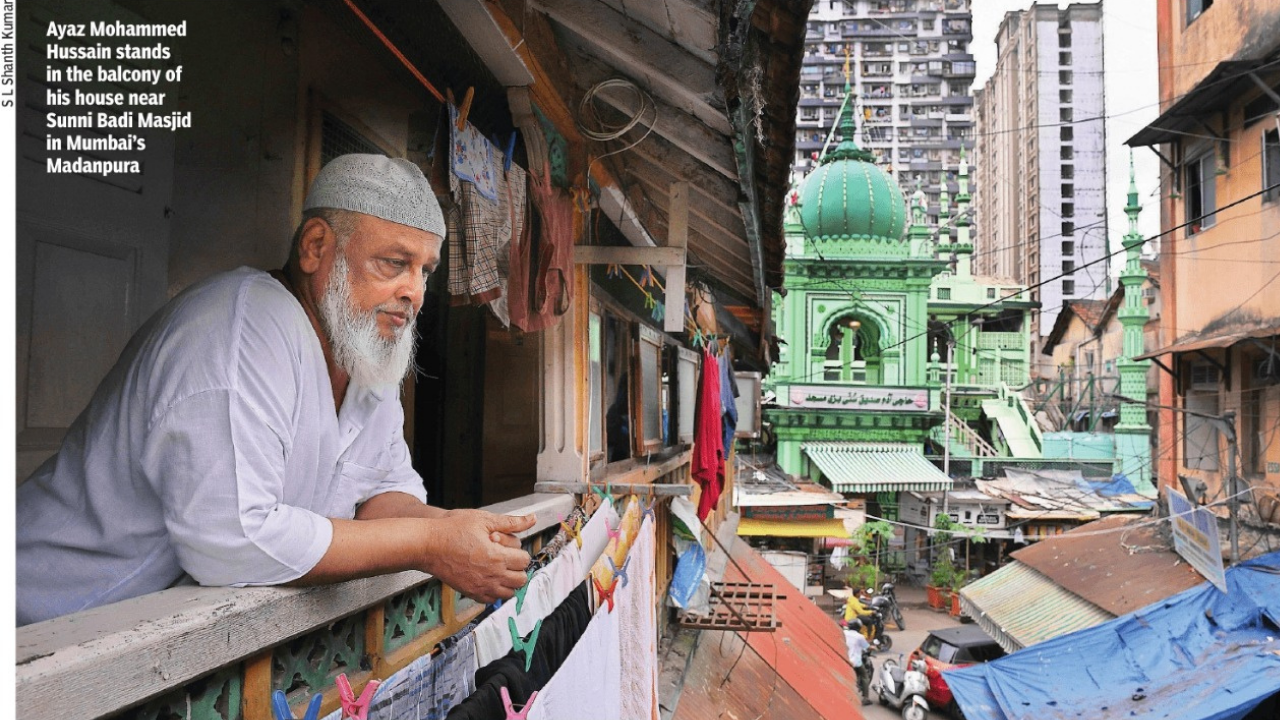ARTICLE AD BOX

MUMBAI: Right opposite Sunni Badi Masjid in central Mumbai’s Madanpura lives Ayaz Mohammed Hussain’s family — in a two-room house in an old building named Chhota Isa. Hussain, 65, a retired railway guard, and wife Shama never had to check namaz time on their wall clock or mobile.
The 127-year-old mosque’s loudspeakers amplified the azan five times a day. Until the night of June 24, when police took them down.Residents of Madanpura and many other parts of the city are now experiencing an unexpected stillness in their immediate environment since police in Mumbai began enforcing noise guidelines two months ago.
“We are coming to terms with the new norm. For years, we were used to listening to azan on loudspeakers,” says Hussain, standing in the gallery, gazing at the mosque’s green minarets, no longer mounted with amplifiers.
“Even the announcement of maiyyat (deaths) in the mohalla was made on the loudspeakers. This morning, we learnt of a death in the locality only after the janaaza (funeral procession) passed through my lane.
”

Living Without The CallThe city, especially its Muslim pockets, is gradually learning to live without the call for prayer on loudspeakers ever since the Devendra Fadnavis govt, acting on a court order, began to crack down. It’s an initiative that has political overtones, given the sporadic protests organised in the past by right-wing outfits against mosques.
This time the tipping point has been a lack of resistance from minority religious groups, who would rather take recourse to law to settle the issue.Bombay high court, through its Jan 2025 verdict, graded the punishment for violation of noise control in three stages — warning, penalty (Rs 5,000 per day) and seizure of loudspeakers. But the cops began enforcing the noise guidelines (55 decibels in daytime and 45 decibels at night) strictly only after BJP leader Kirit Somaiya turned it into a personal crusade. When police teams stopped him from holding protests in the mosques’ vicinity, he would visit police stations to remind them about the court order.Rise Of The Azan AppFor the observant, OnlineAzan, an app, has since become the go-to tool for real-time updates from their neighbourhood place of worship. “We began broadcasting the azan on this app soon after police removed loudspeakers. Initially, many opposed it, as they said it might affect the legal challenge to police action against loudspeakers in Bombay high court,” says Raees Ansari, a member of the Sunni Badi Masjid’s management committee.
Nearly 5,000 people in his locality have downloaded the app, and the number is increasing as word spreads, he adds.The increasing use of the free app indicates a significant change sweeping through Muslim neighbourhoods, where the call to the devout, simultaneously from multiple mosques, would often draw complaints, especially from other communities. “Azan on loudspeakers is not mandated by Islam. Muslims here should have voluntarily removed loudspeakers.
Globally, many mosques broadcast azan through apps,” says Bandra resident and city Congress general secretary Asif Farooqui.The Noise Pollution AngleAnti-noise pollution activist Sumaira Abdulali, who had filed a petition in 2004 demanding enforcement against use of loudspeakers by all faiths, said it was in 2016 that the court said, “Religion is not a reason to break noise rules.”Managing trustee of Mahim Juma Masjid, Fahad Khalil Pathan, informs that 72 mosques in the city have switched to the app, partly indicating the community’s willingness to embrace technology for reforms.
It also reflects inability of mosque managements to stonewall police action.Pathan says he was the first in the city to download and introduce it at his mosque. “A group in Chennai created this app a couple of years ago. This has been a big source of relief, since we introduced it after many complained that they didn’t have a way of knowing azan time,” he says.What forced many mosques to voluntarily bring decibel levels down to permissible limits or remove loudspeakers was the state additional director general of police (ADGP)’s circular of May 11, 2025.
It said all religious places seeking permission for use of loudspeakers needed to submit property cards and registration certificates from the Waqf Board or charity commissioner.“This was deliberately done to discourage mosques from applying for permission to use loudspeakers. The police have no business to ask for property cards or registration certificates because neither high courts in any state nor the Supreme Court mandated it while giving guidelines on use of loudspeakers,” argues former minister Arif Naseem Khan. Khan led a meeting of senior clerics and imams, where it was decided that a legal panel, led by advocate Yusuf Muchchala, would challenge the police action. The matter is sub judice.Some mosques, including Rahe Medina Masjid in Maharashtra Nagar, within the sprawling slum of Mankhurd, have even installed small sound boxes on request in nearby homes to relay the azan and skirt the ban. “We did it soon after Maharashtra Navnirman Sena (MNS) leader Raj Thackeray began protesting against azan on loudspeakers in 2022. Small speakers linked to the machine inside the mosque broadcast the azan to around 50 homes in the locality. It does not disturb anyone,” says mosque committee member Razzak Shaikh.Enforcing Noise GuidelinesNon-Muslims have largely cheered the silencing of the loudspeakers. Abraham Mathai, the former vicechairman of state minorities commission and a longtime resident of Kalina, which has a sizable Muslim population, says he used to be quite annoyed by the sound through the day.
“I welcome this move by many mosques and request people of all religions to take steps to reduce loudspeaker decibels while they celebrate festivals,” Mathai says.Now, as Ganesh Chaturthi, Maharashtra’s most popular Hindu festival, nears, many feel Mumbai Police will be on test to ensure they are as proactive in enforcing the noise guidelines at pandals as they were at mosques.“The police removed loudspeakers from our mosque at night, refusing to wait for the next morning, when a Muslim delegation was scheduled to meet deputy CM Ajit Pawar. Will the cops show such urgency while they deal with complaints of noise-rule violations by people of other faiths?” wonders Ansari, standing at the Madanpura mosque’s gate.



.png)
.png)
.png)
















 2 hours ago
3
2 hours ago
3








 English (US) ·
English (US) ·